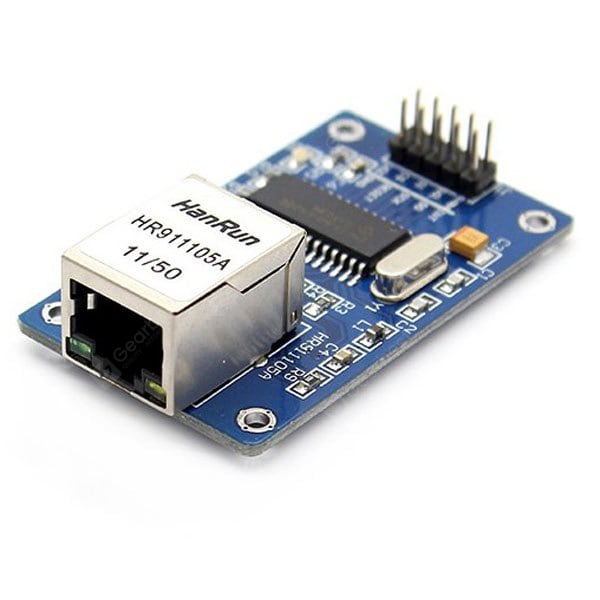Mbed library for ENC28J60 Ethernet modules. Full support for TCP/IP and UDP Server, Client and HTTP server (webserver). DHCP and DNS is included.
Dependents: mBuino_ENC28_MQTT Nucleo_Web_ENC28J60 Nucleo_Web_ENC28J60_ADC Serial_over_Ethernet ... more
Library for ENC28J60 Ethernet modules.

Ported to mbed from Norbert Truchsess's UIPEthernet library for Arduino. Thank you Norbert!
- Full support for persistent (streaming) TCP/IP and UDP connections Client and Server each, ARP, ICMP, DHCP and DNS.
- Works with both Mbed OS 2 and Mbed OS 5.
Usage:
- Import the library into your project.
- Add
#include "UipEthernet.h"tomain.cpp - Create one instance of the UipEthernet class initialized with the MAC address you'd like to use and SPI pins of the connected Mbed board.
Example programs:
Import programWebSwitch_ENC28J60
HTTP Server serving a simple webpage which enables to remotely turn a digital output on/off. Compile, download, run and type 'IP_address/secret/' (don't forget the last '/') into your web browser and hit ENTER.
Import programHTTPServer_Echo_ENC28J60
A simple HTTP server echoing received requests. Ethernet connection is over an ENC28J60 board. Usage: Type the server's IP address into you web browser and hit <ENTER>.
Import programTcpServer_ENC28J60
Simple TCP/IP Server using the UIPEthernet library for ENC28J60 Ethernet boards.
Import programTcpClient_ENC28J60
Simple TCP/IP Client using the UIPEthernet library for ENC28J60 Ethernet boards.
Import programUdpServer_ENC28J60
Simple UDP Server using the UIPEthernet library for ENC28J60 Ethernet boards.
Import programUdpClient_ENC28J60
Simple UDP Client using the UIPEthernet library for ENC28J60 Ethernet boards.
Import programMQTT_Hello_ENC28J60
MQTT Client example program. Ethernet connection is via an ENC28J60 module.
utility/uip_timer.c
- Committer:
- hudakz
- Date:
- 2020-07-23
- Revision:
- 18:8d5738a6646e
- Parent:
- 8:4acb22344932
File content as of revision 18:8d5738a6646e:
/**
* \addtogroup timer
* @{
*/
/**
* \file
* Timer library implementation.
* \author
* Adam Dunkels <adam@sics.se>
*/
/*
* Copyright (c) 2004, Swedish Institute of Computer Science.
* All rights reserved.
*
* Redistribution and use in source and binary forms, with or without
* modification, are permitted provided that the following conditions
* are met:
* 1. Redistributions of source code must retain the above copyright
* notice, this list of conditions and the following disclaimer.
* 2. Redistributions in binary form must reproduce the above copyright
* notice, this list of conditions and the following disclaimer in the
* documentation and/or other materials provided with the distribution.
* 3. Neither the name of the Institute nor the names of its contributors
* may be used to endorse or promote products derived from this software
* without specific prior written permission.
*
* THIS SOFTWARE IS PROVIDED BY THE INSTITUTE AND CONTRIBUTORS ``AS IS'' AND
* ANY EXPRESS OR IMPLIED WARRANTIES, INCLUDING, BUT NOT LIMITED TO, THE
* IMPLIED WARRANTIES OF MERCHANTABILITY AND FITNESS FOR A PARTICULAR PURPOSE
* ARE DISCLAIMED. IN NO EVENT SHALL THE INSTITUTE OR CONTRIBUTORS BE LIABLE
* FOR ANY DIRECT, INDIRECT, INCIDENTAL, SPECIAL, EXEMPLARY, OR CONSEQUENTIAL
* DAMAGES (INCLUDING, BUT NOT LIMITED TO, PROCUREMENT OF SUBSTITUTE GOODS
* OR SERVICES; LOSS OF USE, DATA, OR PROFITS; OR BUSINESS INTERRUPTION)
* HOWEVER CAUSED AND ON ANY THEORY OF LIABILITY, WHETHER IN CONTRACT, STRICT
* LIABILITY, OR TORT (INCLUDING NEGLIGENCE OR OTHERWISE) ARISING IN ANY WAY
* OUT OF THE USE OF THIS SOFTWARE, EVEN IF ADVISED OF THE POSSIBILITY OF
* SUCH DAMAGE.
*
* This file is part of the UIP TCP/IP stack
*
* Author: Adam Dunkels <adam@sics.se>
*
* $Id: timer.c,v 1.2 2006/06/12 08:00:30 adam Exp $
*/
#include "uip_clock.h"
#include "uip_timer.h"
/*---------------------------------------------------------------------------*/
/**
* Set a timer.
*
* This function is used to set a timer for a time sometime in the
* future. The function timer_expired() will evaluate to true after
* the timer has expired.
*
* \param t A pointer to the timer
* \param interval The interval before the timer expires.
*
*/
void uip_timer_set(struct uip_timer* t, clock_time_t interval) {
t->interval = interval;
t->start = clock_time();
}
/*---------------------------------------------------------------------------*/
/**
* Reset the timer with the same interval.
*
* This function resets the timer with the same interval that was
* given to the timer_set() function. The start point of the interval
* is the exact time that the timer last expired. Therefore, this
* function will cause the timer to be stable over time, unlike the
* timer_rester() function.
*
* \param t A pointer to the timer.
*
* \sa timer_restart()
*/
void uip_timer_reset(struct uip_timer* t) {
t->start += t->interval;
}
/*---------------------------------------------------------------------------*/
/**
* Restart the timer from the current point in time
*
* This function restarts a timer with the same interval that was
* given to the timer_set() function. The timer will start at the
* current time.
*
* \note A periodic timer will drift if this function is used to reset
* it. For preioric timers, use the timer_reset() function instead.
*
* \param t A pointer to the timer.
*
* \sa timer_reset()
*/
void uip_timer_restart(struct uip_timer* t) {
t->start = clock_time();
}
/*---------------------------------------------------------------------------*/
/**
* Check if a timer has expired.
*
* This function tests if a timer has expired and returns true or
* false depending on its status.
*
* \param t A pointer to the timer
*
* \return Non-zero if the timer has expired, zero otherwise.
*
*/
int uip_timer_expired(struct uip_timer* t) {
return(clock_time_t) (clock_time() - t->start) >= (clock_time_t) t->interval;
}
/*---------------------------------------------------------------------------*/
/** @} */
